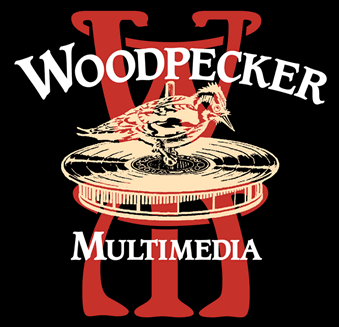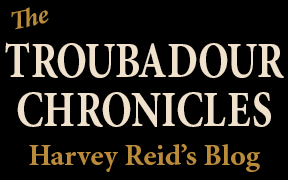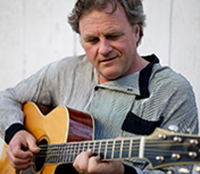 H
H 


|
|
Observations at the Newport Folk Festival 2014I was invited to perform at the 2014 Newport Folk festival for the first time, which was a great honor and a good time. It is one of the oldest, largest and most prestigious folk festivals in the country, and because my performance was on a small stage in the afternoon, my time there was more about me experiencing the festival than it was about the festival organizers or crowd experiencing me. Here are my reactions to the festival. I have no interest in critiquing other artists or passing judgment on them or the festival, and am trying to just pass along my observations, for whatever they are worth. The most striking thing about the festival line-up and audience was their young age, and I was among the top percentiles of age in the entire population of tens of thousands. That alone is startling, since I am used to gray-haired folk music events, where I am younger than most of the audience & performers. This meant that I was also unfamiliar with most of the acts, and it was a chance to see up-close a newer generation of music listeners and musicians. Surprising also was that this was the generation of audience who supposedly no longer buy music, and the fact that the festival sold out months in advance was a sign that at least a sizable chunk of people thought it was worth their while to shell out some money and show up at something called a "Folk Festival." When I was 19, I started going to some of the earliest bluegrass festivals in Virginia and Maryland, not just because I was interested in learning about the music, but because the word was out about what a great party festivals were. The new version of the Newport Folk festival has certainly succeeded in selling tickets to a younger audience, and they have proven that thousands of nice people will show up and enjoy a live music event with the words Folk Festival in the name. It is unclear what role the festival has taken on in continuing the traditions of folk festivals past, or in passing on music, attitudes or stereotypes to a younger audience. It is also unclear whether that sort of thing needs to be done. It is possible that the NFF has poisoned or diluted the whole idea of a folk festival with too much pop music energy, and it is also possible that they have succeeded in some way in wiping a slate clean, putting together artists and audience who have few expectations, less musical-cultural baggage and a refreshing dis-inclination to worship and imitate the usual set of musical stereotypes. Anyone familiar with folk festivals and the Newport Folk Festival in particular would first notice the near-total absence of the performers you would expect to see there, such as Joan Baez, Eric Andersen, Joni Mitchell, Bob Dylan and other well-known aging folk performers who typically headline such events. Here was the line-up. The Friday headliner was Ryan Adams, and Jack White was the Sat. night mainstage finale, and they were both very rock and "slightly folk." Mavis Staples was the Sun. headliner, and a rare typical folk-fest performer. No one will ever agree on exactly what happened, but we can discuss what we saw. Here is what Acoustic Guitar Magazine said about the festival and here is what Rolling Stone Magazine said. The word "folk" has never had any strict meaning, and fans, musicians and critics have been arguing for decades about what it entails, as have rock and hip-hop people and presumably Civil War re-enactment fans who debate the meaning of the terminology in their world. Artists sometimes stay neatly within genres and sometimes they don't, and genres change, though in this ultra-digital age, unfortunately, more music is being placed into boxes and genres than ever because the computers need that. The best definition I ever heard for folk music is that it is when folks play music, which is a paraphrasing of a Woody Guthrie line. In that sense, the 2014 NFF line-up was modern folk music, because there were a lot of folks playing music without seemingly trying to be someone else. Bluegrass festival promoters have been as narrow-minded as any of them, and many a festival has been just bluegrass band after bluegrass band, which makes for a pretty boring experience for any but the hard-core bluegrass fan. The lesson I got from studying Bill Monroe during my bluegrass period, for example, was that Bill took all the music that was around him in Rosine, Kentucky, passed it through his soul and personality, and made an amalgam that was his personal musical statement. Instead of trying to play and sing like Bill, I chose to play and sing like me, but also to study the past, pay attention to styles and genres I liked, and learn to play, sing and write music well and the way it felt right to me. That has made me an artist, though my lack of focus and genre-chasing has made it hard to get included at genre-specific events and even radio shows that just play one kind of music. So I have always ended up in the "folk music" category, though at times I feel like more of a classical guitarist than a folk musician. Enough about me– back to the Newport Folk Festival. We know that in an effort to re-energize ticket sales and perhaps get in touch with the future, the staid old NFF's new director booked a pile of young acts, and completely ignored what most of us think of as a typical NFF folk performer. The reason I was there was to participate in a tribute to Pete Seeger on a small stage, and presumably they didn't feel the need to have performers like me on the big stages. I didn't feel bad in my role, because there were very few featured performers that I consider to me my peers, and they tended to be high-profile acts like Nickel Creek, who are a band and not a solo artist. As far as I could see, there were no highly-skilled solo troubadours there, (we could debate Rodrigo y Gabriela, who have a lot of skills but are mostly about show) but I am accepting of the mysterious fact that we are not included many places. (The musicians that I feel are my peers, who play really well and are singers, pickers, songwriters as well as likeable, experienced performers, such as Mike Dowling, Martin Simpson, Patty Larkin, Pat Donohue, Mary Flower, Bryan Bowers, or Michael Jerome Browne-- are generally not playing high-profile events or getting more airplay or YouTube action than me.) I don't dance around or pay attention to how I look on video, and my kind of music does not translate well to the big stage, and I understand that and accept the situation willingly. I can play rings around Jack White on the guitar, but would not have a chance of kicking his ass on a big stage. He's incredible at that even though he hasn't studied the guitar fingerboard very deeply. Incidentally, I enjoyed his performance as much as anything I saw all weekend. He wasn't the guitar virtuoso I expected but what a great show. The other hilight for me was Aoife O'Donovan's solo set. I have complained privately for years that I don't like folk music theater, and that pretending to be someone who is not pretending to be anything is self-contradictory. Theater is fine, and enjoyable to people, and it has taken over a lot of what we think of at a glance as "authentic" music, though this is nothing new. Bluegrass bands like the Johnson Mountain Boys, for example, are suburban educated people who adopted the music, costumes and mannerisms of 1950's bluegrass bands. The list of performers who do this sort of thing is vast. Bob Nolan was a Canadian who created the Sons of the Pioneers cowboy music group in the 1930's as what seems to me to be pure theater masquerading as authentic cowboy music. Some people argue that essentially every white blues performer is doing some kind of musical theater. There are fascinating books you can read about how this sort of thing has been going on since the days of blackface minstrelsy, and taking new forms. Country music historians like Bill Malone and Richard Peterson think that the periodic appearance in country music of "retro" and supposedly "authentic" performers dates back to the very origins of the genre, and is a constant and cyclic thing. My complaint is that if you are going to impersonate someone, don't impersonate a folk performer whose essence and very definition is that they are just being themselves. Go be yourself instead. At Newport 2014, there were so few theatrical, genre-chasing folk artists that the few performers who sported jeans, boots, cowboy hats and beat-up Martin or Gibson guitars or old suits and pork-pie hats stood out in a way they would not have if nearly all the performers wore those costumes. The swirling interplay in folk music between "authenticity" and "theater" was more obvious than ever to me, and I personally was not comforted or moved by those afore-mentioned artists. Instead I found myself wondering if an old-fashioned gray-haired folk audience would have been comforted or moved, and what they would think of the crop of "non-authentic" folk artists who seemed to be just playing their music the only way they knew how. I found that I enjoyed the "un-authentic" artists more, since they were seemingly being more authentic, though it is possible that they were just imitating younger, hipper artists that I wasn't familiar with. The Milk Carton Kids are clearly channeling Simon & Garfunkel to some degree, for example. When the Newport Folk festival was started in the 1950's, the prevailing idea in folklore circles was that folk musicians played a lot of traditional, public domain material, and were generally not professional entertainers. Listeners went to a folk festival to experience blues, Cajun, bluegrass, old-time and other seemingly "authentic" genres of music. As folk music has evolved as an occupation, we now see that all mainstage artists at folk festivals are full-time practitioners of their art, with the most successful of them being very adept at business. The 2014 line-up really seemed to have very little of the usual energy of cultural exploration, and the bio and blurbs used to describe the artists talked a great deal about fame and popularity. The word "folk" almost seems now to refer to a level of intimacy or popularity rather than the type of music or the cultural background of the performers. In the minds of listeners, there is possibly a component of "uncorporate" or "independent" associated with the word "folk," though at a big festival like Newport the heavy hand of the usual music business machinery seems to be lurking behind a lot of the action. (If you're going to sell tickets, you need popular performers, which means it can't be all grassroots and indie music.) There is a constant buzz in most circles of music I've experienced about who is poised to be the next big thing, implying that somehow emerging artists are more valuable and important than seasoned veterans. In literary circles, first novels are seen as very valuable to publishers, and the quest for "fresh" ideas and new writers drives a surprisingly large part of that business. Whether it is desirable to stock a folk festival with people who are climbing the pop music ladder is unclear, though somehow when someone becomes famous it strokes and justifies everyone who booked them or bought their music. Face it: modern folk music happens when modern kids bang away in their basements on whatever instruments they have and pass the music they are familiar with through their personalities and come up with whatever they can. The fact that modern kids can listen to Leadbelly, Katy Perry, Hank Williams, Bob Marley and Jimi Hendrix in the same moment and become influenced by them all just means that the diversity of what they end up with is endless. It would have been hard in the past to be equally influenced by Billie Holiday and Bill Monroe, since their music was piped in very different information pipelines. Nowadays anyone's computer or iPod can mix up untold numbers of artists and kinds of music, and this sort of thing is creating multitudes of musical cross-pollinations. The fact that a young person today has so much cultural information available to them means that they can adopt a reasonable facsimile of the music and costumes of almost any kind of music that has preceded them, and we are now seeing a kaleidoscope of permutations of musical influences as a result. The hybrid styles young artists are coming up include the kinds of mutations that could not have happened easily in the past, such as merging influences from different eras and sub-cultures, and from both famous and obscure predecessors. Folk might just mean "indie" to a lot of people now, and it is exciting to think that corporate control of music is continuing to shrink. After almost 90 years of heavy-handed big money dictating everything about which musicians can be recorded, heard or known about– we are seeing the castle walls crumbling still as the music industry regroups and retreats. Perhaps an end result is that corporate control will change its ways without having to relinquish its grip, and perhaps somehow the people may regain control of the people's music in a way that hasn't been seen since the onset of recording, broadcasting and amplification in the 1920's. The music business is going through what the beer and food industries have been doing for some time, and something resembling the concept that local food and micro-breweries are better, more meaningful and greener than corporate food and beer is trying to work itself into the music business. We don't really celebrate local music, but we seem to like musicians we see as independent, who have soul, energy, spirit and behave like humans and not robots. Even though none of the younger, hipper performers really moved me, made my hair stand up, or made me want to take my music in a new direction or tune my guitar in a new way, I enjoyed the spectacle and was comforted by the apparent financial and cultural success of the festival. I wish I had been able to see more of the acts also. ©2014 by Harvey Reid
WOODPECKER MULTIMEDIA
|